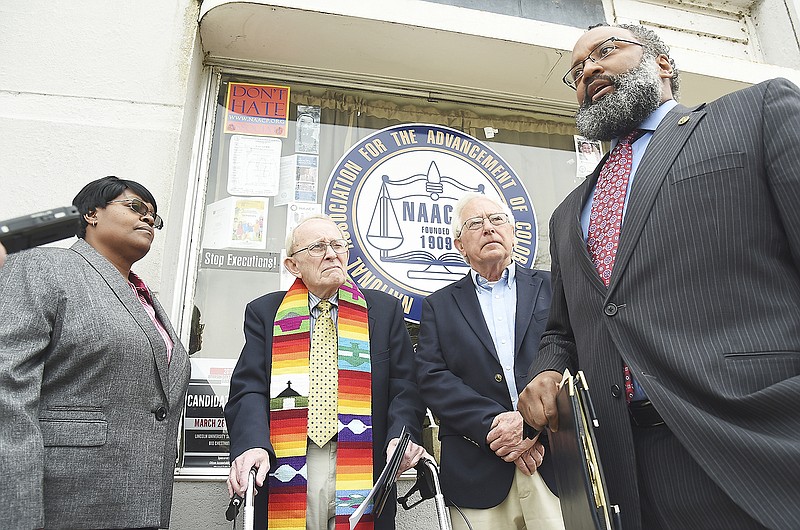Missouri's NAACP said Wednesday it's launching a new statewide effort "to ensure that individuals in Missouri have the ability to complain and seek redress from their government," state President Rod Chapel announced.
"(Protesting is) a firm American tradition, and one that we hold to be as sacred as those rights entrusted to us in the Constitution. In order for us to be able to exercise those, they cannot be over-criminalized," he said.
The Rev. Kim Woodruff of Quinn Chapel A.M.E. Church said the legislative proposals are an "attempt to control the response of the unheard, and those who are continually hit in the head, and even killed by unjust laws, policies and behaviors. These bills are punitive in nature."
She quoted the Rev. Martin Luther King Jr., saying: "You can't hit me in the head and (then) tell me how to holler."
Don Love with Empower Missouri added: "Certainly, one of the basic principles of our society is that everybody be able to articulate what their views are.
"Instead of doing things that limit that ability, we should be working toward creating a culture in which it's easier for people to speak their minds, so that we can better understand what different points of view are and support each other as we move toward a consensus."
And the Rev. Jon Bennett, a retired Jefferson City pastor, said: "Protest is essential if I am to live out my faith. The prophet Micah said, 'Do justice. Love mercy. And walk humbly with God,' which is to walk in solidarity with all who are in pain or who are hurt or are victims of injustice and oppression."
Chapel said a bill sponsored by state Sen. Jeanie Riddle, R-Mokane, as well as two proposed House bills are "an effort to ensure that Missourians are silenced."
Riddle didn't respond Wednesday to a request for comment for this story.
However, in February, she told the Senate's Judiciary and Civil Jurisprudence Committee that many residents in her six-county district asked her to sponsor the bill.
Many of those requests, she said, came from the eastern part of her district, which includes Callaway, Audrain, Montgomery, Warren, Lincoln and Monroe counties.
In presenting her bill to the Senate committee nearly three months ago, Riddle didn't specify the 2014 demonstrations in and near Ferguson after teenager Michael Brown was killed or after a St. Louis County grand jury chose not to indict the police officer involved in the Brown shooting.
Nor did she mention last year's demonstrations following a St. Louis judge's decision that prosecutors didn't show beyond a reasonable doubt that a police officer had committed a crime when he killed an unarmed man after a high-speed chase.
"The concerns (constituents) cited were in relation to being able to get medical treatment, and emergency services not being able to respond to emergencies, or being trapped on a roadway without the ability to exit from the location," Riddle said. "When protest leads to potential loss of life or an increased health risk or injuries, many find that that is unacceptable - myself included."
Chapel said Wednesday, "There's already a law that makes it a misdemeanor. There's certainly restraints that could be used now, and we don't think they need to be increased at all."
Riddle's bill would make it a Class A misdemeanor, with a fine of $1,000-$5,000 or a jail sentence from seven to 30 days if the protest results in the obstruction of an interstate highway or limited access highway - or in the "unreasonable" and physical obstruction of emergency services personnel.
"I think the reality is that not only have we not had any circumstances where that was a factor, but they already had the ability to arrest you for a misdemeanor," Chapel said. "Whatever danger would have been caused could already be taken care of under existing law."
Chapel and others also are concerned with two bills that would make the protests felony crimes - but two bills in the House with that proposed punishment still have not gotten a committee hearing.
He admits he may be taking a minority position compared with the Legislature's conservative majority.
However, Chapel said: "I think you've got to protect the rights of the minority, whether that's from a protected category standpoint or just within society to ensure that everybody has the right to seek redress."
And, Love said: "It seems to me that everybody has an interest in the reasonable opportunities to protest and reasonable guarantees that public safety is maintained."

